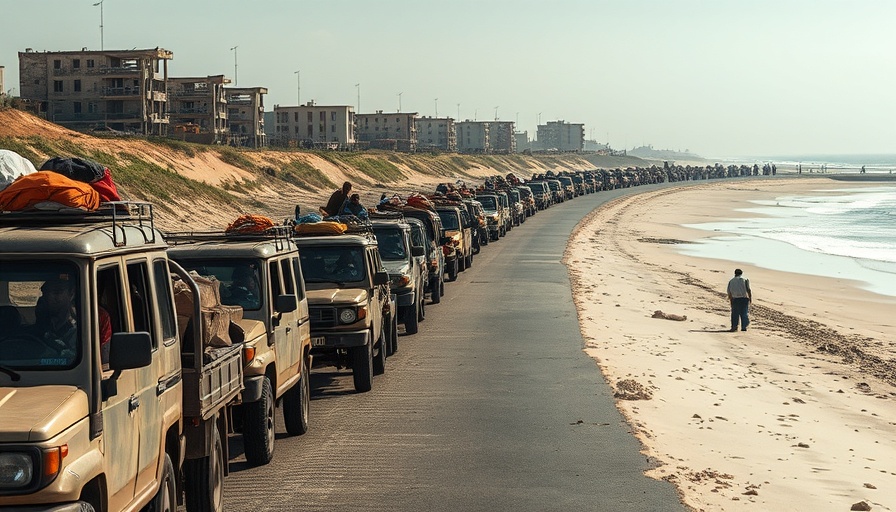
Escalating Tensions: A Desperate Situation in Gaza City
The Israeli military has officially commenced its ground offensive in Gaza City, an action that many fear could exacerbate an already grave humanitarian crisis. With thousands of civilians fleeing the area, the streets are lined with vehicles and people seeking safety. This operation is the largest escalation in the Israeli-Palestinian conflict seen in nearly two years, further complicating an already fragile situation.
Humanitarian Crisis: Why This Matters
As the offensive progresses, the situation in Gaza continues to deteriorate. The United Nations has issued warnings about a humanitarian disaster, highlighting that the infrastructure has been severely compromised. Health facilities, shelters, and safe zones have become almost non-existent as bombings expand and access to essential services diminishes. The international community is increasingly vocal about the need for urgent humanitarian aid to support the thousands of individuals who remain trapped within the beleaguered city.
The International Reaction: Complex Global Perspectives
The latest offensive has drawn sharp condemnation from various international entities. Following the offensive, a UN inquiry labeled the actions of Israel as potential genocide, prompting Israel to vehemently dispute these claims. This reflects a significant divide between perspectives in the global community, as nations grapple with the implications of this conflict. U.S. officials, including Secretary of State Marco Rubio, have acknowledged the urgency for a ceasefire while simultaneously supporting Israel's right to defend itself.
Implications of the Ground Offensive: What Lies Ahead?
Military analysts speculate that the Israeli Defense Force is preparing for prolonged engagements in urban areas of Gaza. This could lead to increased civilian casualties and further draw international scrutiny. As the Israeli government maintains its focus on dismantling Hamas's military capabilities, the humanitarian plight intensifies, raising important questions about the balance between military objectives and humanitarian obligations.
Insights From Conflict Histories: Learning from the Past
This current offensive evokes memories of previous conflicts in the region, where escalations have led to severe humanitarian conditions. The lessons from 2014’s Operation Protective Edge, where the conflict resulted in significant civilian casualties and widespread destruction, remind us of the urgent need towards conflict resolution approaches that prioritize peace over escalation. Historical patterns illustrate that without a steadfast commitment to dialogue and negotiation, the cycle of violence is poised to repeat itself.
A Glimmer of Hope: Is Peace Possible?
Despite the overwhelming challenges, the voices calling for peace continually echo. Grassroots movements within both Israeli and Palestinian communities advocate for understanding, dialogue, and mutual respect, emphasizing that lasting change begins at the community level. Both sides have experienced tremendous loss, and many believe that healing requires more than just political agreements — it necessitates genuine connection and compassion among peoples. If leaders heed this call, a different future might be birthed from the ashes of conflict.
Next Steps: The Role of the Global Community
The continued violence in Gaza necessitates a multifaceted response from the international community. Increased humanitarian aid efforts, diplomatic engagement, and an inclusive dialogue process are essential components in moving towards a more stable environment. As the offensive unfolds, the global citizenry is called to remain engaged, informed, and empathetic towards those affected by conflict.
In conclusion, as we witness the unfolding crisis in Gaza City, we must advocate for immediate humanitarian assistance and sustained efforts towards a peaceful resolution to the Israeli-Palestinian conflict. By striving for empathy and understanding, we not only honor those suffering but also work towards a future devoid of such despair.
 Add Row
Add Row  Add
Add 




Write A Comment